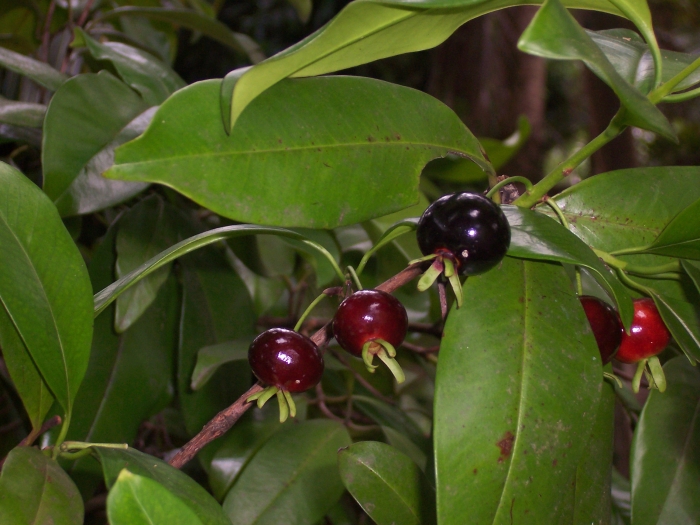Brazil Cherry
(Eugenia brasiliensis)
Brazil Cherry (Eugenia brasiliensis)
/
/

B.navez assumed
CC BY-SA 3.0
Image By:
B.navez assumed
Recorded By:
Copyright:
CC BY-SA 3.0
Copyright Notice:
Photo by: B.navez assumed | License Type: CC BY-SA 3.0 | License URL: http://creativecommons.org/licenses/by-sa/3.0/ | Uploader: B.navez | Publisher: Wikimedia Commons | Title: Eugenia_brasiliensis.JPG | Notes: |



















Estimated Native Range
Summary
Eugenia brasiliensis, commonly known as Brazil Cherry, is an evergreen tree native to the Atlantic Forest of Eastern Brazil, particularly in the states of Bahia to Rio Grande do Sul. It typically grows to a height of 20 meters and features a dense, rounded canopy. The Brazil Cherry is known for its ornamental value, with glossy green leaves and white flowers that bloom in the spring. The flowers are followed by small, round fruits that mature to a purple to black color, with a sweet cherry to plum-like flavor. The inner flesh of the fruit is white to yellowish and is edible, often consumed fresh or used in jams, jellies, and pies.
Brazil Cherry is valued for its attractive appearance and edible fruits, making it suitable for urban landscaping and as a fruit tree in gardens. It is also appreciated for its relatively small size, which allows it to fit into smaller urban spaces. While it can adapt to full sun or part shade, it thrives best in well-drained soils with consistent moisture. Despite its slow growth and low dispersal rate, which contribute to its rarity in the wild, it is not difficult to cultivate. However, due to its status as an endangered species, sourcing plants from responsible nurseries is crucial to avoid contributing to its decline in the wild.CC BY-SA 4.0
Brazil Cherry is valued for its attractive appearance and edible fruits, making it suitable for urban landscaping and as a fruit tree in gardens. It is also appreciated for its relatively small size, which allows it to fit into smaller urban spaces. While it can adapt to full sun or part shade, it thrives best in well-drained soils with consistent moisture. Despite its slow growth and low dispersal rate, which contribute to its rarity in the wild, it is not difficult to cultivate. However, due to its status as an endangered species, sourcing plants from responsible nurseries is crucial to avoid contributing to its decline in the wild.CC BY-SA 4.0
Plant Description
- Plant Type: Tree
- Height: 16-24 feet
- Width: 14-16 feet
- Growth Rate: Slow
- Flower Color: White
- Flowering Season: Spring
- Leaf Retention: Evergreen
Growth Requirements
- Sun: Full Sun, Part Shade
- Water: Medium
- Drainage: Medium
Common Uses
Bee Garden, Bird Garden, Butterfly Garden, Edible*Disclaimer: Easyscape's listed plant edibility is for informational use. Always verify the safety and proper identification of any plant before consumption., Fragrant, Hedges, Low Maintenance
Natural Habitat
Native to the Atlantic Forest of Eastern Brazil
Other Names
Common Names: Grumichama, Brazillian Cherry Tree, 巴西櫻桃
Scientific Names: , Eugenia dombeyi, Eugenia brasiliensis, Eugenia ubensis, Stenocalyx brasiliensis, Eugenia bracteolaris, Eugenia brasiliensis var. leucocarpa, Stenocalyx brasiliensis var. silvestris, Eugenia brasiliensis subsp. erythrocarpa, Eugenia brasiliensis subsp. leucocarpa
GBIF Accepted Name: Eugenia brasiliensis Lam.